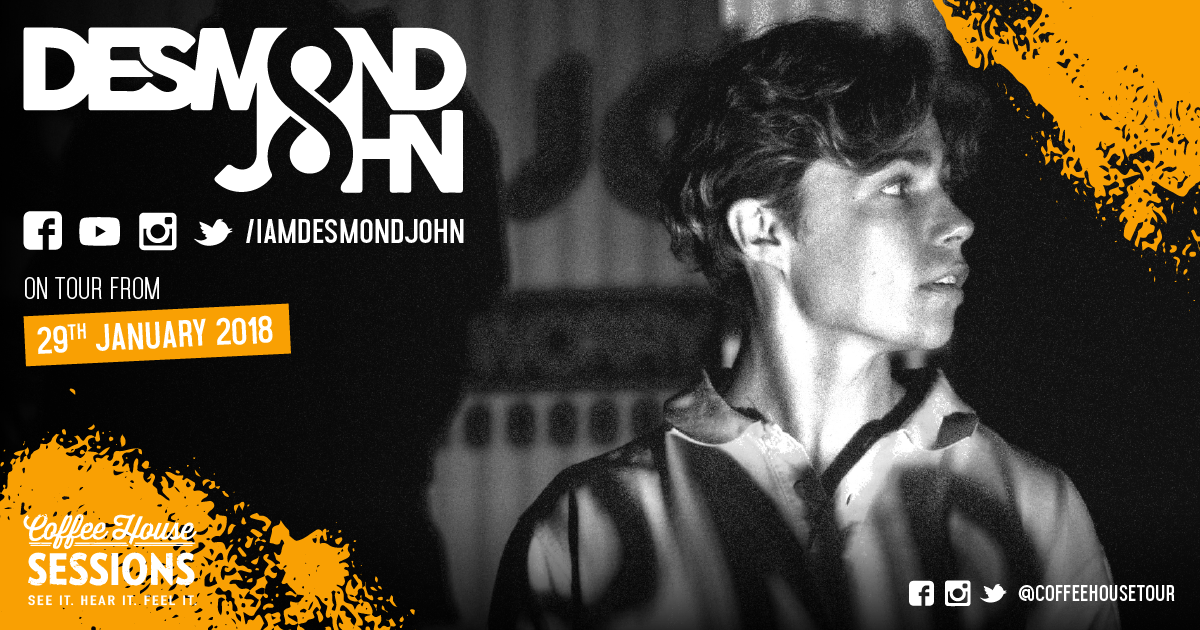Desmond John’s eclectic repertoire teaches us about introversion
Three years, three locations – South Africa, USA and the UK – but this is the 19-year-old’s first ever tour. Desmond John crossed paths with a musical career unconventionally, being discovered in a Johannesburg studio by an American comedian, taking a chance offer to go to the States and then working with a Grammy Award winning producer. He only began doing shows this year, but he has been in the studio for a while now and 2018 may well be his year. John’s influences are old school R’n’B artists – Al Green, Curtis Mayfield and Eric Benet – as well as Bruno Mars, whose songs feature on his covers. His half-hour set features a mashup of “It Will Rain” and “Talking to the Moon”, as well as a cover of Drake’s “Brand New” – all are gentle, acoustic renditions which fit comfortably with the welcoming affection I am given when I meet him after his set. Not being trained classically in both piano and guitar has not prevented his manipulation of musical principles, it appears, and John hopes that he will able to better himself in this respect as his career develops. For now though the process is simple, albeit raw. In his own words: “People don’t remember lyrics, they remember melodies,” and so words come later, drawn up from real-life as well as imagined experiences, and put to a four-chord sequence determined in advance.
He stresses the need for “eclecticism” to recreate the “unique headspace” which gave rise to each feeling
While leaving school prematurely took a big hit on his relationships back home – “I didn’t grow up surrounded by friends” – once it transpired that music was a viable career, the toll was not so tough. John also talks to me about the trials of being a solo performer. He has had clashes with publicity in the past relating to decisions over both creativity – “they were sending me songs that were already finished and my only job was to sing them” – and, being made to wear things he disliked, aesthetics. One would imagine this to be particularly difficult for an individual artist whose songs are, as he describes, a “journal” in which he can record moods. It’s why genre is such a constraint, and John is determined to shake off any labels he has been assigned in the past, especially the R’n’B-pop tag. He stresses the need for “eclecticism” – to be sad on one track and braggadocious on the other – in order to recreate the “unique headspace” which gave rise to each feeling, and believes genre only inhibits this vision. “One day I might want to do a rock song and that should be allowed,” he says, “because it might break in this genre, and why should that be a problem?”
Going solo has been difficult (“I never really found anyone I clicked with”) but he doesn’t expect this to be a natural occurrence in any case. It’s made clear that his independence is no detriment to success, and in fact the two have a positive relationship because his measure of success is wholly undefined by income. “I don’t care whether I’m at a bar on Friday nights or in arenas performing to crowds,” he says quite firmly. This begs the obvious question – are there any other paths he would pursue in the event that the work of these past few years does not materialise? For starters, he has an obvious entrepreneurial flair which itself allowed him to get to this point; he and a friend set up an online marketing agency, using the proceeds to purchase the tickets that would take him to America in 2014. John too has his heart set on being a full-service performer, citing the famed entertainer Justin Timberlake.
“A truly lonely person flocks to crowds”
The most unexpected facet of his career though, he says, is the sheer amount of time it takes. “People underestimate that. I’ve been in the industry for nearly three years which to music industry standards is like two minutes. It’s a wake-up call saying, ‘I’m not the only one who can sing. I’m not the only one who can play.’” Perhaps this is why he has come to the conclusion that continuing to produce for other artists alongside a string of summer festivals wouldn’t be a bad idea and, in order to vary his routine, opening a studio in Cape Town is also on the agenda, since he is keen to “understand how other artists tick”. However, a marked change has taken place in his musical direction: since late last year everything has become original, and the middle parting shouts Cole Sprouse and the 90s in a way that foreshadows his upcoming EP release. The set’s two unreleased originals give a flavour of what is to come; “I Mean That” has jazz overtones but “Let It Tip”, a contrast, is less representative of the era and a personal tribute to John’s late mentor Tip Green. That John is an introvert becomes clear and at the end of our conversation, I learn something about introversion that I wasn’t expecting to, “A truly lonely person flocks to crowds…I don’t like being among crowds but I like being on stage, and I get my energy from spending time alone.” I conclude that he’s humble and cultured as well as wise and independent, and as a result am curious to see what his future holds.

Comments